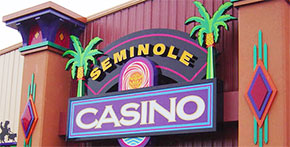Seminoles Up The Ante In Gambling Negotiations
June 25, 2015
The Seminole Tribe has given the state 30 days to strike a new accord about exclusive rights to operate banked card games and has put the state on notice that tribal casinos don’t have to shut down the games even in the absence of a revamped deal.
Wednesday’s letter from tribal chief James Billie is the Seminoles’ latest effort to force state leaders into negotiations about the lucrative card games and comes a month before a deal giving the tribe “exclusivity” over the games is set to expire.
 Billie sent state leaders a “notice of commencement of compact dispute resolution procedures,” setting in motion a 30-day period for both sides to meet over the banked card games, which include blackjack. The dispute resolution mechanism requested by the tribe is included in a 20-year agreement, inked in 2010, that set out the parameters for the Seminoles’ gambling operations in Florida.
Billie sent state leaders a “notice of commencement of compact dispute resolution procedures,” setting in motion a 30-day period for both sides to meet over the banked card games, which include blackjack. The dispute resolution mechanism requested by the tribe is included in a 20-year agreement, inked in 2010, that set out the parameters for the Seminoles’ gambling operations in Florida.
The compact also included a five-year deal, slated to sunset at the end of July, that gave the tribe exclusive rights to operate banked card games at five of its seven casinos. In exchange, the Seminoles agreed to pay the state a minimum of $1 billion over five years. The payments would stop if anyone else in the state offers the “banked” games.
“It’s my opinion that the tribe is utilizing these arguments and the dispute resolution provision to get into a room with state leaders in order to continue a discussion on the balance of the term of the compact and the operation of banked cards,” said Senate Majority Leader Bill Galvano, a Bradenton lawyer who helped craft the original compact. “From a legal strategy standpoint, it’s a good strategy. I disagree with the arguments that they’re making, but it at least gives them a procedural methodology to negotiate with the state.”
Lawmakers failed to approve a new agreement during the regular session that ended in May, and discussions between the tribe and Republican legislative leaders have gone nowhere this year. Gov. Rick Scott handed over the issue to House and Senate leaders after a deal between the governor and the Seminoles blew up in the waning days of the 2014 legislative session.
In Wednesday’s six-page letter hand-delivered to Scott, Senate President Andy Gardiner and House Speaker Steve Crisafulli, the Seminoles contend that they can continue to offer the card games with or without a new deal because of state-authorized gambling activities taking place elsewhere.
The alleged violations of the compact would allow the tribe to stop making direct payments to the state and instead deposit the money into an escrow account, Billie wrote.
“While the tribe could have exercised its right to do so immediately, it has thus far elected to continue making its payments to the state and, as a gesture of good faith, intends to continue making its payments to the state pending the resolution of this dispute,” he wrote.
Billie’s arguments included a claim the tribe has made for years regarding slot machines that look like blackjack and roulette, authorized by state gambling regulators at non-tribal pari-mutuels. The slots operate essentially the same as the banked games, Billie wrote, the only difference being that the cards are electronic instead of paper, “a distinction we assert is without a difference.”
The Seminoles also raised a new issue on Wednesday, however, about whether player-banked card games in which the “bank” is another player instead of “the house” — first authorized by state gambling regulators in 2011and now at play in at least three pari-mutuel facilities — also violate the tribe’s rights to exclusivity. “Banked” card games, such as blackjack, are typically considered those in which players bet against the house instead of each other.
But Billie’s letter asserts that the National Indian Gaming Commission considers player-banked card games to be a form of banked card games.
“That is a very arcane area but, as I read their letter, it’s not something that I find to be ridiculous,” said Steve Geller, a former state senator and attorney who specializes in gaming law. “This may be a way of forcing the state into negotiation. I tend to disagree with most of it, but I don’t find them to be open and shut issues, particularly if the NIGC (National Indian Gaming Commission) has interpreted this player-banked card game to be a banked card game.”
by Dara Kam, The News Service of Florida



Comments